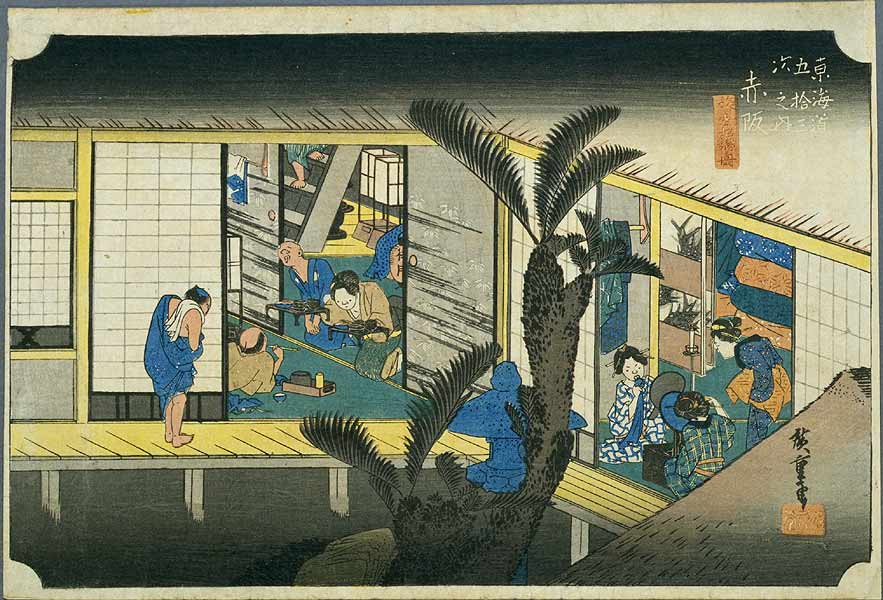Akasaka-juku (Tōkaidō) on:
[Wikipedia]
[Google]
[Amazon]
 was the thirty-sixth of the fifty-three stations of the Tōkaidō. It is located in present-day Toyokawa,
was the thirty-sixth of the fifty-three stations of the Tōkaidō. It is located in present-day Toyokawa,
 Ōhashi-ya (大橋屋), an inn that first opened in 1649, less than half a century after the creation of the Tōkaidō, still operates today. The building it uses was built in 1716. During a census in 1733, there were 83 inns in Akasaka-juku, but only Ōhashi-ya remains today. At its peak, though, there were 349 buildings, including three '' honjin'', one sub-''honjin'' and 62 '' hatago''.
Goyu-shuku was less than 2 km from Akasaka-juku, making them the closest stations on the whole of the Tōkaidō. At Sekigawa Shrine (関川神社) in Otowa, Matsuo Bashō wrote the following
Ōhashi-ya (大橋屋), an inn that first opened in 1649, less than half a century after the creation of the Tōkaidō, still operates today. The building it uses was built in 1716. During a census in 1733, there were 83 inns in Akasaka-juku, but only Ōhashi-ya remains today. At its peak, though, there were 349 buildings, including three '' honjin'', one sub-''honjin'' and 62 '' hatago''.
Goyu-shuku was less than 2 km from Akasaka-juku, making them the closest stations on the whole of the Tōkaidō. At Sekigawa Shrine (関川神社) in Otowa, Matsuo Bashō wrote the following
 was the thirty-sixth of the fifty-three stations of the Tōkaidō. It is located in present-day Toyokawa,
was the thirty-sixth of the fifty-three stations of the Tōkaidō. It is located in present-day Toyokawa, Aichi Prefecture
is a Prefectures of Japan, prefecture of Japan located in the Chūbu region of Honshū. Aichi Prefecture has a population of 7,461,111 () and a geographic area of with a population density of . Aichi Prefecture borders Mie Prefecture to the ...
, Japan
Japan is an island country in East Asia. Located in the Pacific Ocean off the northeast coast of the Asia, Asian mainland, it is bordered on the west by the Sea of Japan and extends from the Sea of Okhotsk in the north to the East China Sea ...
. It was only from Goyu-juku, the preceding post station.
History
Along with the preceding Yoshida-juku and Goyu-shuku, Akasaka-juku was well known for its '' meshimori onna''. The classic ukiyo-e print by Andō Hiroshige (''Hoeido'' edition) from 1831–1834 depicts a typical inn; the scene is divided in half by a sago palm in the center. To the right, travellers are taking their evening meal, and to the left, prostitutes are putting on make-up and preparing for the evening entertainment. Due to its reputation, Akasaka was a popular post station with many travellers. Ōhashi-ya (大橋屋), an inn that first opened in 1649, less than half a century after the creation of the Tōkaidō, still operates today. The building it uses was built in 1716. During a census in 1733, there were 83 inns in Akasaka-juku, but only Ōhashi-ya remains today. At its peak, though, there were 349 buildings, including three '' honjin'', one sub-''honjin'' and 62 '' hatago''.
Goyu-shuku was less than 2 km from Akasaka-juku, making them the closest stations on the whole of the Tōkaidō. At Sekigawa Shrine (関川神社) in Otowa, Matsuo Bashō wrote the following
Ōhashi-ya (大橋屋), an inn that first opened in 1649, less than half a century after the creation of the Tōkaidō, still operates today. The building it uses was built in 1716. During a census in 1733, there were 83 inns in Akasaka-juku, but only Ōhashi-ya remains today. At its peak, though, there were 349 buildings, including three '' honjin'', one sub-''honjin'' and 62 '' hatago''.
Goyu-shuku was less than 2 km from Akasaka-juku, making them the closest stations on the whole of the Tōkaidō. At Sekigawa Shrine (関川神社) in Otowa, Matsuo Bashō wrote the following haiku
is a type of short form poetry that originated in Japan. Traditional Japanese haiku consist of three phrases composed of 17 Mora (linguistics), morae (called ''On (Japanese prosody), on'' in Japanese) in a 5, 7, 5 pattern; that include a ''kire ...
, because they were so close:
:夏の月 御油より出でて 赤坂や
:''Natsu no tsuki / Goyu yori idete / Akasaka ya.''
:"By the summer moon, / depart out from Goyu and / reach Akasaka."
When the construction of the Tōkaidō Main Line bypassed the area, it missed out on many of the economic advantages that the railroad brought. Furthermore, even though the area gained connections to rail networks with the construction of the Meitetsu Nagoya Main Line, it was still unable to flourish because none of the express trains stopped at Meiden-Akasaka Station.
Neighboring Post Towns
;Tōkaidō : Goyu-shuku - Akasaka-juku - Fujikawa-shukuFurther reading
*Carey, Patrick. ''Rediscovering the Old Tokaido:In the Footsteps of Hiroshige''. Global Books UK (2000). *Chiba, Reiko. ''Hiroshige's Tokaido in Prints and Poetry''. Tuttle. (1982) *Taganau, Jilly. ''The Tokaido Road: Travelling and Representation in Edo and Meiji Japan''. RoutledgeCurzon (2004).References
{{DEFAULTSORT:Akasaka-Juku (Tokaido) Stations of the Tōkaidō Stations of the Tōkaidō in Aichi Prefecture